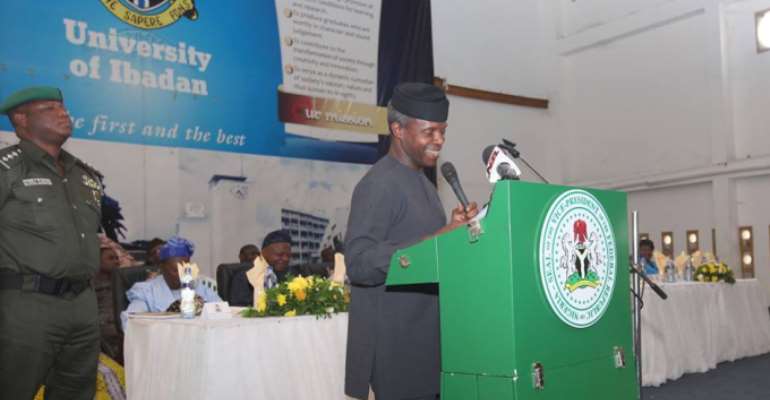Nigeria Lost Close To $15b To Fraudulent Security Equipments Spending – Osinbajo

SAN FRANCISCO, May 02, (THEWILL) – Vice President, Prof Yemi Osinbajo, SAN, has disclosed, Nigeria lost about $15B to fraudulent and corrupt practices in the security equipment spending during the last administration,
Osinbajo spoke on Monday at the book presentation of the Ibadan-based elite group, House of Lords, which just published an in-depth analysis by different experts titled 'Nigeria: The Challenges of Growth and Development,' at the University of Ibadan.
While observing that the Federal Government has kept on a sustained fight against corruption, he said the country simply cannot sustain the shocking level of public sector corruption in particular adding that the implementation of the 2016 budget would commence soon.
“By the grace of God in the next few days we will begin the implementation of one of the most ambitious budgets in our history. Ambitious not just in its size but more in its broad range of fiscal and other socio-economic policies,” he said.
“When you look at the sheer amount of money that have been embezzled, the sheer amount of money lost from any of these various cases of corruption, and you will find that far too much has been lost.
“It was discovered a few days ago that the total amount of money lost just to corruption in part of and provision of security equipment in the military is closer to 15 billion US dollars.
While the nation’s foreign reserves is now around about $27B, Prof Osinbajo, driving home the stark significance of the such corruption, noted that the $15 billion figure is more than half of the current foreign reserves of the country.
“I believe strongly that it is important to send a message that no public officer can steal the resources of this country and expect to escape. I hope the message would be loud and clear and it will inform behaviour in the future.
“What the Buhari presidency is trying to do is to ensure that there are consequences for corruption and we try to send a message that anyone who is found to have been corrupt would not only dislodge the property they have stolen but will also pay for it in terms of the sanctions of the law.
“The limits of the growth and development of most nations largely depend on the strength of the value-driven influence of their elite, indeed it is evident that the reason for the development and growth of most societies is not resources, but values, (otherwise African countries will be the most developed.)
“I have argued elsewhere that the privileged, or the elite both individually and collectively have a responsibility, an obligation to society, to plan it, organise it, order or reorder it and above all to make sacrifices for it, for the maximum benefit of all.
“This is the burden of privilege. It is their -elite-obligation individually and collectively to chart the course for the millions. They define and house the ethos and the public sense of the people. It is their expected role to find common cause across professions, vocations, ethnicities and faiths, defining the minimum terms and conditions for the safety, security, growth and prosperity of the community.
“To a large extent the ethical space has been vacated by the Nigerian elite. In its place are all manner of excuses and false justifications of bad behaviour. Today ethnicity and religion protect corruption and abuse of power. Mediocrity is encouraged by the subjection of merit to variations of quota systems. Quotas are not in themselves wrong, but must be the exceptions not the rule.
“It is my humble submission so, that it is the business of the Nigerian elite through its most revered social institutions to promote the values that are fundamental to development and growth. Policies are often only as good as the character and commitment of its implementers.”
Story by David Oputah
